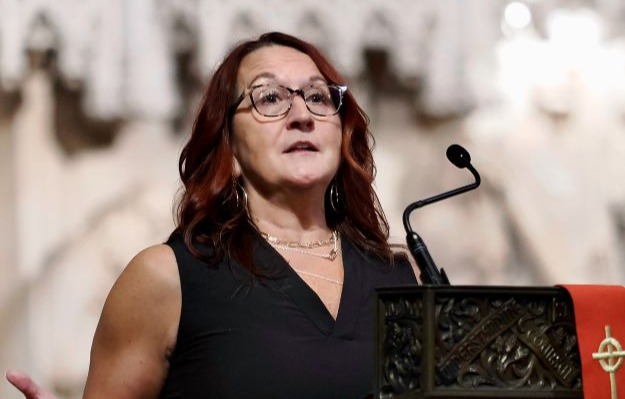Commentary on John 14:8-17 [25-27]
I want us to start with an assumption: The disciples have reasonable requests because to be in a relationship is to have the space to have questions. Many times, in our reading of the disciples, particularly in their conversations with Jesus, it is easy to perceive their questions and wonderings as a lack of faith or trust, but there’s a more curious read of the text. When we choose to be generous with the disciples and their humanness of walking with Jesus through unprecedented, miraculous, and also wildly disconcerting times, we also have access to a generosity toward ourselves as we ask questions, wonder, and try to navigate what it means to walk this journey of faith.
Read around the text
To get at the heart of this story, and why these questions and inquiries from Jesus’ community are so important and helpful for us to see, we need to read beyond the pericope offered by the lectionary. Our pericope starts with Phillip telling Jesus, “We will be okay if you will show us the Father.” Just prior, Jesus has told the disciples that he is going to go and prepare a place for them so that they will be able to be with him. He names his Father’s house as having many rooms (John 14:2). Thomas (my favorite curious questioner) then asks, “Lord, we don’t know where you are going, so how can we know the way?” and Jesus answers, “I am the way.” It is from here that we begin our pericope with Phillip.
Why is this important?
The disciples are trying to figure out all these hints in the statements Jesus is making about his time beyond earth, and what it means to be in relationship with the Father—the Divine Parent— he speaks so frequently of. They have been journeying with Jesus, who has shown them the way each step, and now Jesus is saying there will be more to the journey, where he will show up differently. He is both the way and naming that he won’t always be with them. While the answers may feel comforting for us now, with access to the entire story of Jesus, for the disciples this could be reasonably confusing. This text invites us to honor the emotions that arise and to consider questions and inquiry as a practice of faith.
In the spirit of curiosity and inquiry, here are some questions to consider:
- What is the significance of Jesus calling God “Father”?
This language is not always easy for hearers to access, depending on their own history with parental relationships and their history with God being identified as “father” in a way that is not loving. One might consider that in addition to the explicit “parental” language, Jesus is showing intimacy and relationship to one from whom he comes and one, as he names frequently, whom he trusts and believes in fully. Leaning into intimacy allows for nuance for those for whom parental language is hard.
- What are the “greater works than these” (verse 12)?
Jesus tells the disciples they will do even more than what they had witnessed. This might have been alarming because they had seen so much that was deemed impossible, yet Jesus reminds them that the work is not done and that they, too, have the power and gift of the Holy Spirit through Jesus’ name and God’s power. This is a powerful type of faith, to trust in relationships over what might feel like harsh realities.
- Why might the Spirit that is sent be called the Advocate (verse 26)?
In the Spirit of Pentecost, this part of the text cannot be lost. Jesus promises a sojourner who will come when he leaves, a part of this divine support system that will be with them forever in a way he cannot. “Advocate” means a supporter, defender, and guide to what is good. In that way, Jesus reminds them of how important it is to know they are not alone and that there will always be a guide to help them not just to do greater works, but to be greater people, loving and pouring into the world around them. The Holy Spirit, the Advocate, will help them keep the commandments of Jesus, far beyond Jesus’ time on the physical earth.
- What is the peace that is left with us (verse 27)?
Peace is often described as the absence of turmoil, yet Jesus, knowing that these disciples both have experienced and are headed into harsh times, offers this word: “peace.” Peace then feels like an invitation to community and trust. The peace is found in the collective. In reminding them they are neither alone in spirit nor in flesh, there’s a possibility of ease and trust that might feel like peace amidst it all.
Pentecost is about relationship.
- The relationship of God who exists beyond and yet loves us so deeply that God became flesh to develop empathy and intimacy with the human experience.
- The relationship of Jesus, who walked alongside so many, especially his beloved friends known as his disciples, and gave them wisdom that they might not have grasped fully but that would carry them beyond his time with them.
- The relationship of the Advocate, with the disciples as a forever companion to guide and direct them.
- The relationship of each of us to our faith and what supports us in carrying that faith.
This reminder of Pentecost is a reminder that God companions with us, above us, alongside us, and within us to guide us toward the work of loving and living a life like Christ. It is the hope that we have all that we need in community with the fullness of the divine and one another to operate as people of faith and bring that love, justice, and hope into the world.




June 8, 2025